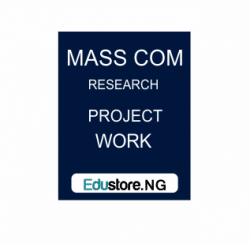CHAPTER ONE
INTRODUCTION
1.1 Background of the study
The Federal Radio Corporation of Nigeria is the Pioneer Broadcast Organization in
Nigeria with a rich culture of excellence. Available records reveal that Radio Broadcasting was introduced into Nigeria in 1933 by the then colonial Government. It relayed the overseas service of the British Broadcasting Corporation through wired system with loudspeakers at the listening end. The service was called Radio Diffusion System, RDS. From the RDS emerged the Nigerian Broadcasting Services, NBS in April 1980. Prior to the NBS, the colonial Government had commissioned the Nigerian Broadcasting survey, undertaken by Messrs Byron and Turner which recommended the establishment of stations in Lagos, Kaduna, Enugu, Ibadan and Kano. Mr. T.W. Chalmers, a Briton and controller of the BBC Light Entertainment Programme was the first Director-General of the NBS.
Radio ownership and control has since colonial times been subjected more to political exigencies than economic forces. Successive governments have, in the laws they enact and enforce, made it abundantly clear that the press was at the mercy of politics, and that the political tune to which a paper dances was enough to ensure its survival or death Abramsky, (2005). The laws and their implementation have seldom encouraged private investment in the media nor given radio proprietors reason to believe that it is feasible to run it as a business by attracting advertisement revenue with good circulation figures.
DOWNLOAD COMPLETE WORK
DISCLAIMER:
- For Reference Only: Materials are for research, citation, and idea generation purposes and not for submission as your original final year project work.
- Avoid Plagiarism: Do not copy or submit this content as your own project. Doing so may result in academic consequences.
- Use as a Framework: This complete project research material should guide the development of your own final year project work.
- Academic Access: This platform is designed to reduce the stress of visiting school libraries by providing easy access to research materials.
- Institutional Support: Tertiary institutions encourage the review of previous academic works such as journals and theses.
- Open Education: The site is maintained through paid subscriptions to continue offering open access educational resources.



